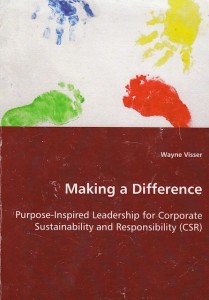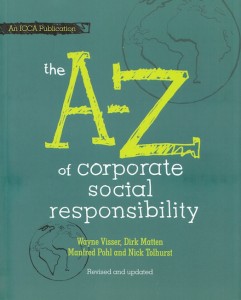A Typology of Meaning
Chapter by Wayne Visser
Extract from Making a Difference
Chapter Objectives
- To define what is meant by “typology of meaning”;
- To introduce a typology of meaning for sustainability managers, including its four proposed types and key features;
- To use the interview data to illustrate the applicability and workings of the typology; and
- To conclude with a summary of the possible management implications of the typology of meaning for sustainability managers.
For the purposes of my research, “typology of meaning” refers to the classification of typical sources of meaning derived by sustainability managers in their work into four types, each associated with distinctive roles within the organisation.
Introducing the Typology
The typology grew out of a realisation that four of the six sources of meaning in the work of sustainability managers were strongly related to organisational roles. The typology was included in the Sustainability Managers Research Model (Figure 4.1) that was presented to participants in the Phase 3 follow up interviews and received positive feedback. This section will introduce the four types that I identified, as well as the dynamics of the model.
The Four Types
We can begin by identifying the four types: Expert, Facilitator, Catalyst and Activist. Each type represents a constellation of meaning. It is expected that any individual sustainability manager will embody elements of all of these types, but that the relative influence of each category will differ per individual. Hence, the dominant type can be thought of as a centre of gravity for meaning in the sustainability managers’ work, i.e. the mode of operating in which they feel most comfortable, fulfilled or satisfied.
We can visually represent the idea that people derive meaning from a variety of sources by showing the types as boxes in four quadrants. The relative size of the shaded boxes simply indicates how much meaning the individual derives from each type. Hence, in the case depicted, the individual is perfectly balanced, showing equal preference for each of the types.
An Expert derives relatively more meaning from the constellation of characteristics associated with this type.
There is considerable overlap between the Expert type and specialist input as a source of meaning in work (Chapter 6). Therefore, rather than repeat the illustrative quotations from the interviews in full, Table 8.1 presents typical statements and phrases indicative of Expert type sustainability managers.
These quotes illustrate some of the themes that characterise the way Experts find their meaning, namely by engaging with projects or systems, giving expert input, focusing on technical excellence, seeking uniqueness through specialisation, and pride in problem solving abilities.
Characteristics of the Expert
- Aligned to specialist input as a source of meaning;
- Concerned mainly with the individual level;
- Focuses on personal development;
- Derives satisfaction from delivering quality through their work;
- Skills are mainly technical in nature;
- Emphasise specialist knowledge; and
- The legacy they wish to leave behind is successful work projects …
Continue reading
[button size=”small” color=”blue” style=”download” new_window=”false” link=”http://www.waynevisser.com/wp-content/uploads/2012/03/book_mad_chap8_typology_of_meaning.pdf”]Pdf[/button] A Typology of Meaning (chapter)
Related pages
[button size=”small” color=”blue” style=”info” new_window=”false” link=”http://www.controlatest1.co.uk/waynevisser/making-a-difference/”]Page[/button] Making a Difference (book)
Cite this chapter
Visser, W. (2008) A Typology of Meaning, In Making a Difference: Purpose-Inspired Leadership for Corporate Sustainability and Responsibility, Saarbrücken: VDM, 218-237.





























































